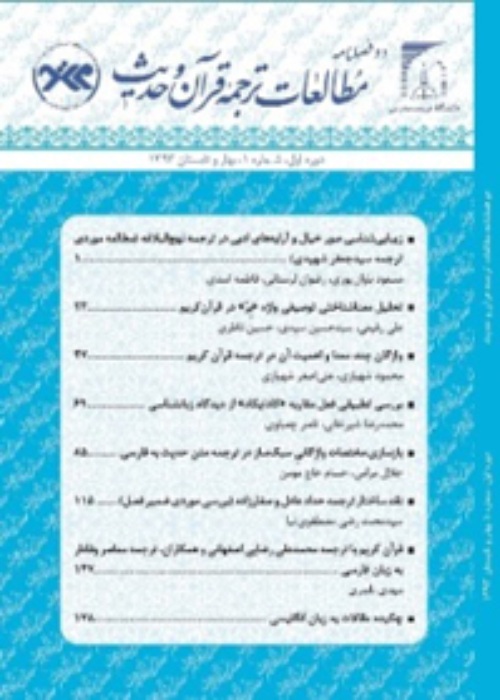The methods of translating secondary meanings of imperative verbs in the Holy Qur’an translated by Saffarzade
The role of rhetoric and its specific status in the deep perception of the Quran as well as the correct understanding of its irreplaceable teachings is undeniable. The investigation of secondary meanings in declarative and explanative sentences is one of the essential contexts within the semantics which is considered as a branch of rhetoric. The current study uses a descriptive-analytical method. This paper overview the secondary meanings in imperative verbs of the Quran. It also investigates the techniques used by Tahereh Saffarzadeh concerning the explanation of these meanings in the translation of imperative verses of the Quran. She is one of the contemporary translators of the Quran. In the next step, we will take assistance from the interpretations of the Quran and rhetoric books to achieve an exact secondary meaning of these sentences. We will also compare the translation of the intended translator with four other translations to somehow privilege the error derived from arbitration to some extent. The results indicate that Saffarzadeh has chosen three different techniques to translate the imperative sentences with secondary meanings: (1) The replacement of imperative verb with an analogy equivalent to secondary meaning in the target language; (2) According to the expressive text of the verse concerning the secondary meaning, the perception of secondary meanings is entrusted to the reader; and (3) Failure to use an analogy despite the absence of transparency in the text of the verse concerning the expression of secondary meaning. The investigation of the translating techniques of Saffarzadeh indicates her precision and adherence to the transfer of secondary meanings within the imperative verbs. In the cases where she just translates the words instead of analogy to express the secondary meaning, the transfer of secondary meaning is completely correct and this meaning can be understood by the reader.
- حق عضویت دریافتی صرف حمایت از نشریات عضو و نگهداری، تکمیل و توسعه مگیران میشود.
- پرداخت حق اشتراک و دانلود مقالات اجازه بازنشر آن در سایر رسانههای چاپی و دیجیتال را به کاربر نمیدهد.


